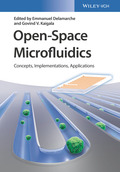Open-Space Microfluidics
Concepts, Implementations, Applications

1. Edition March 2018
XX, 419 Pages, Hardcover
169 Pictures (124 Colored Figures)
Monograph
Short Description
Edited by the pioneers and pacesetters in the field at the forefront of research, this up-to-date book offers unrivaled coverage of the latest trends and the current state of the art in this new and rapidly expanding area.
Buy now
Price: 169,00 €
Price incl. VAT, excl. Shipping
Euro prices for Wiley-VCH and Ernst & Sohn titles are only valid for Germany. In EU countries, local VAT applies. Postage will be charged.
Summarizing the latest trends and the current state of this research field, this up-to-date book discusses in detail techniques to perform localized alterations on surfaces with great flexibility, including microfluidic probes, multifunctional nanopipettes and various surface patterning techniques, such as dip pen nanolithography. These techniques are also put in perspective in terms of applications and how they can be transformative of numerous (bio)chemical processes involving surfaces.
The editors are from IBM Zurich, the pioneers and pacesetters in the field at the forefront of research in this new and rapidly expanding area.
Microfluidic Probe Introduction
Hierarchical Hydrodynamic Flow Confinement
Microfluidic Probe on Tissue Sections
Microfluidic Probe Basic Theory
Microfluidic Probe Brain Slices
Microfluidic Probe Quadrupole
Multifunctional Nanopipette
Nanopipette for Single Cell Pharmacology
Microfluidic Probe for Single Cell Proteomic Profiling
PART II - LOCALIZED CHEMISTRY
Multiphase Liquid Patterning
From DNA Nanopatterning to Cell Studies
Dual Pipettes
Dip Pen Nanolithography
Chemistrode
Microfluidic Probe for Probing Electrical Contact
Currently, he leads a research group at IBM Research on "precision diagnostics" with the goal of solving medical problems using microfluidics, micro- and nanotechnology and collaborations with biological and medical experts.
Dr. Delamarche has authored more than 120 scientific publications and has received numerous awards, including the Werner Prize from the Swiss Chemical Society in 2006.
Govind Kaigala obtained his PhD from the University of Alberta, Canada, in 2008. After a postdoctoral stay at Stanford University, USA, he moved to IBM Research in Zurich, Switzerland, in 2010. His research interests include micro/nano-bio-systems and assays for microchip-based chemical and biomolecular analysis.
He is currently leading activities on liquid-based non-contact scanning technologies - microfluidic probe - and is championing concepts on "microfluidics in the open space" and "tissue microprocessing". These research activities are driven by specific needs in the fields of pathology and personalized medicine.
Dr. Kaigala has authored more than 40 scientific publications and received several awards, including an IBM Research Division Accomplishment Award and the 2014 Horizon Alumni Award from the University of Alberta.


